 If you have noticed a lack of posts here, I will say that it was not for lack of effort. I must have started a blog 93 times before erasing it.
If you have noticed a lack of posts here, I will say that it was not for lack of effort. I must have started a blog 93 times before erasing it.
Also, I have this little matter of surgery tomorrow, and all of my time has been spent getting my affairs in order in case the very real possibility that I do not wake up.
Ha! I really had you going there. It's an outpatient procedure, and while I will be doped up, I'll be out of there in a few hours. Unfortnately, this procedure on my arm will seriously inhibit my ability to write — physicially, it's going to be impossible for several days.
If I'm lucky, I won't be able to write ever again.
There you have it. My first legitimate excuse for taking off the blog for a week.
I'll think of you in my morphine dreams.
Yay Bears.
Wednesday, January 24, 2007
Shouldering a Burden
Saturday, January 20, 2007
Experience Vs. Research Vs. My Sitting on My Ass and Doing Nothing
 It is certainly a measure of the writer’s mentality when he or she starts to wish that they’d had a childhood trauma, simply so they could write about it.
It is certainly a measure of the writer’s mentality when he or she starts to wish that they’d had a childhood trauma, simply so they could write about it.
I don’t mean that literally, of course. The case of the boy who was kidnapped and disappeared for four years in St. Louis isn’t something I would want to have endured, for instance. But the wack part of my brain keeps thinking this: it would make awesome material for a book.
In the otherwise loathsome movie “Happiness,” there is a funny scene in which a poet, who has gained notoriety through her series of poems about being raped (“Rape at 11,” “Rape at 12,” “Rape at 13…”) admits that she is really a fraud.
“Who am I kidding?” she thinks, paging through her book. “I’ve never been raped.” This leads to her trying to arrange being raped, for material, as it were.
I’m not envious of writers like Augusten Burroughs, who made literary (and financial) hay out of a twisted childhood. Nor is it a wise thing to even suggest that writers need to have such experiences to write about them — fiction or otherwise — for I imagine that you would have a bevy of them read this and say, “I have to become a heroin junkie for research, damnit!”
Research, as opposed to experience, is a different matter. Of not what we have lived, I’ve always found that “doing research” for a novel has always been one of the odder facets of writing. You’re learning about somebody else’s life so you can write about them as a fictional character. Or put another way: why the hell do I need to learn about something I’m going to make up, anyway?
The master
Wife is a fiend when it comes to research; I am Mr. TK. I’ll write something and to hell if it’s accurate or not. I’ll write that the Czar of Pittsburgh freed the Serfs of Finland in 1478, because I can always change it later. If it’s wrong, who cares, because I made up the whole damn thing anyway.
The Internet has made a joke out of research, to some degree. We can type in “mass murderer” and “early bird special” and learn about all the serial killers over the age of 75. But that doesn’t really get us in the mind of the codger per se, and I imagine that one would have to interview such a person, read psychology text, or hang out in nursing homes or Shoneys. If you were writing a book about such a person, that is.
Perhaps because I am lazy except in matters of rationalization, I’ve always felt that the mania for research can go too far. The man who is often credited with being the über-reporter in these matters is Emile Zola, who hung out with striking coal miners and wrote “Germinal,” and while he is acknowledged to bringing a new level of realism to fiction, I don’t envision many people rushing out to their favorite Left Bank bookstore and asking for "Germinal" these days except when there's a strike in France, which actually means Zola's heirs are doing quite nicely.
On the other hand, “Madame Bovary” seems to have flowered directly from Flaubert’s brain, and we know that The Story of Emma B. gets just a tad more attention than Zola’s tale of the grimy, unfortunate dudes in the coal shafts.
Or take “Lolita.” Despite the pedophilia, despite the lushness of his prose, despite the Europe-Meets-America tension in Humbert Humbert’s life in the U.S.A., “Lolita” is essentially a road trip novel, a travelogue of which Nabokov drew from his own experience.
“Wow! Looks swank,” Lolita says upon laying eyes upon The Enchanted Hunters, his “vulgar darling” all naïve to Humbert’s faux suavity (methinks Humbert Humbert is the original Eurotrash). Nabokov makes several references to Flaubert in “Lolita” (so says "The Annotated 'Lolita,'" because really, folks, do you think I'm smart enough to make the connection on my own?), and if the circumstances of Emma Bovary and Delores Haze are wildly divergent, they both end in tragedy, a sense of which no amount of research can prepare one to express with words.
Back to the drawing board
I guess I am writing all this for the mere reason that I am coming face-to-face with the reality that if I am to continue trying to write fiction, I will need to get rid of this nasty habit of making stuff up and hoping that it’s right. (And I thought about writing a book about that kid who was kidnapped for four years, despite his opportunities to split, which makes me wonder just what happened…)
And if I want to write non-fiction — even first-person essays about Wife and Son and such — I’ll need to do some research, even interviews.
Uh, any volunteers? Feel free to e-mail me.
Tuesday, January 16, 2007
Whence Thou Art a Snob
 Anybody who knows me will say, “That Bookfraud despises pretentious people, writing, and art. That’s probably why he can’t sit through a ballet, video installations, and ‘Jackass 2.’”
Anybody who knows me will say, “That Bookfraud despises pretentious people, writing, and art. That’s probably why he can’t sit through a ballet, video installations, and ‘Jackass 2.’”
Those people would be right. I hate pretense, for the simple reason that most of the time, I don’t get what the bugger is trying to say, making me look stupid. I’d rather be hit with a sharply hit line drive in the face than look stupid. So I’ll just ignore the whole thing altogether.
Hand-in-hand with pretense goes snobbery. If you don’t understand a work of art, thinks the snob, you must be uncivilized or just plain dumb.
I’ve been cogitating on this ever since I started seeing raves for Joanna Newsom’s “Ys,” a 2006 CD full of long, digressive tracks filled with heavy orchestration, harps and oblique but poetic verse.
Wondering what the fuss was about — “Ys” seemed to be on every “Best of 2006” list out there — I downloaded a couple of tracks.
To say this was difficult to listen to is like saying it’s hard to listen to the screams in a psych ward. Newsom is undeniably talented with the harp, but her compositions head towards atonal, her lyrics are digressive, and she has a voice that sounds as if it was born from the unholy union of Kate Bush and a hillbilly. It’s like listening to Schoenberg while a train screeches to a stop.
It’s pretense personified. Only snobs (i.e. critics) could get into this crap.
Ah, but you've probably spotted my hypocrisy. Only someone who is a snob would even mention Schoenberg (see extremely constipated-looking man, below), and only a person with amazing pretense would even compare Newsom to a classically trained composer. That’s my weakness. When it comes to music, I’m a snob. And I hate myself for it.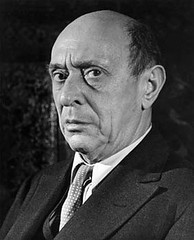
Twelve tones and 1,000 broken eardrums
I was one of those insufferable teenage boys who defined his friends by what graced their turntables. If you hated The Beatles, the Stones, Dylan, or the Clash, I probably would not have been your friend. You just didn’t have taste.
This snobbery got worse through college, as I learned more about music, proving that a little knowledge is a dangerous thing. I went so far as to write embarrassing letters to friends why they had to listen to the DKs and surrounding oneself with bad music was a living death.
As I expanded my horizons, my sense of superiority grew with it. You don’t like Coltrane? You don’t even own any Coltrane? Or even any Charlie Parker, Lionel Hampton, or Dizzy Gillespie? You troglodyte!
But it wasn’t until started going to the symphony in my mid-20s that my snootiness grew completely out of control. I signed up for a concert subscription, bought CD after CD, and really listened to them.
Today, classical music is the only kind I ever attend in concert — about five to ten times a year, on average. I’ve probably been to the symphony or recitals about 50 or 60 times.
Of course, I would never mention such a number gratuitously in order to show how cultured and intellectually superior I am over knuckle-dragging Neanderthals who wouldn’t know a concerto from a symphony from a Paris Hilton album.
This is pretty strong stuff from a fellow who can't play an instrument or read music.
I’ve talked about my hatred of pretentious or humorless fiction. And I know I’ve blogged about music ad nauseum, to the point that if you read between the lines, you can clearly see a nose pointed skyward. But the more I consider my youth — an exercise that I do frequently as the brat approaches birth — I realize that much of my worldview is shaped, for better or worse, by music.
Rock concerts and LPs sustained me through my sexless teenage years; a piano concerto played a role in my courting of Wife.
But what really strikes me is how much music plays a huge role in my writing. My novel is, essentially, about music and youth. The protagonist plays in a rock band, hangs out at blues clubs, and finds that is life is defined by a certain swivel-hipped fellow from Tupelo, Miss.
There’s more and more of this crap. Several short stories feature song lyrics (invented or existing) or entire scenes are set up with notes in the background. One story was predicated on the protagonist hearing “Also Sprach Zarathrusta” while he’s on hold. Another was titled “Sinatra Saves Stephen.”
So I come full circle here. Perhaps I judge Ms. Newsom too harshly; after all, many of her fans admit that her singing takes a bit of getting used to. It can’t be that all those critics who put “Ys” on their “Top 10 of 2006” are all wrong.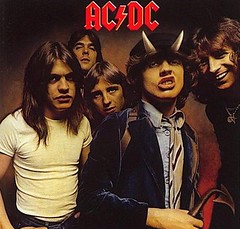
What the hell
I’ll probably give it another chance, otherwise, I risk being a reverse snob, fearing that what I cannot understand is inferior.
Or I can just blast “It's a Long Way to the Top (If You Want to Rock and Roll)” at 11, and to say, to hell with Joanna Newsom.
Excellent choice, Bookfraud.
Labels: parenthood, pretense, snobbery, writing
Friday, January 12, 2007
Canada's Leading Export
 Wife is Canadian, which I do not hold against her, although isn't something I like known in public.
Wife is Canadian, which I do not hold against her, although isn't something I like known in public.
Canucks can be an odd bunch. Canadians hate Americans. They really do talk funny, and they are obsessed with hockey, much worse than any Yank (as they are wont to call us) is besotted with baseball or football. And they hate Americans.
On the plus side, Canada has given us excellent advances in cuisine, particularly in doughnuts and beer. Margaret Atwood, Alice Munro, and Robertson Davies are Canucks. They have spectacular scenery and they have Montreal. Best of all, they can be hilarious.
Second City's Toronto outpost and its extension, SCTV, gave the world Dan Akroyd, Gilda Radner, Catherine O'Hara, Andrea Martin, Eugene Levy, Dave Thomas, Joe Flaherty, Rick Moranis, Martin Short, and, lest we never forget, the late, great John Candy. That's not to mention "The Kids in the Hall," "Trailer Park Boys," and Jim Carrey, who, I understand, has fans who actually think he's a laff riot.
Now, I point you to another great comedic innovation from the Great White North: the Canadian Public Service Announcement.
Before you read further, watch the video below. You will find it disturbing or you will die laughing.
This is undoubtedly one of the funniest things I have ever seen.
The television show mentioned above is an appropriate reference: the guy goes flying through the air like an SCTV dummy. I didn't think, "Wow! Drinking and driving is awful!" but rather "That's what you get when you're a pompous ass talking into a camera and not paying attention to what's going on around you. I also thought, "That's awesome."
I literally laughed until it hurt. Wife came over to look at me, and must of thought me a sicko. But as Mel Brooks said, "I stub my toe, it's a tragedy. You fall into a hole and die, that's comedy." (Similar spots put out by the same outfit show people hurt in car crashes, and are definitely not humorous.)
There are also two other Canadian PSAs worth viewing, though I am reticent to post them. They show violence against women, which is not humorous in the least. However, these PSAs are so far over the top that they left me with my mouth hanging open, in the "I can't believe they actually did this" sense of things. (See them here and here. Warning: at least one of you will find these offensive, or offensive that I found any type of humor in them.)
What will strike anyone about all of these PSAs is the violence, the idea being that showing a car crash or woman being soaked in hot coffee will horrify the viewer to think, "Hey, maybe drinking and driving or this domestic violence thing isn't so great after all!"
I came across these nuggets as I was trying to recall yet another PSA from our friends north of the border, in one of my all-time pieces of lost television. In the spot, a man throwing down a Molson's and his daughter are seen leaving a cookout.
We then see the father and daughter driving away. Dad runs through a stop sign, the daughter screams "Daaaaaaad!", and a semi tractor-trailer slams into the side of the car. (As my brother-in-law aptly put it, "The T-bone!")
Cut to the man who hosted the cookout. He's on the telephone. The look on his face indicates that he's just learned that the Maple Leafs have moved to Memphis, Tennessee, but it is something less serious.
"What do you mean?" he says. "They were just here." I don't know how the police would know that the victims were just at the cookout, especially the implication that they're dead.
(If anyone out there knows where to find this clip, please alert me now. I will name our first born after you, especially if your name is Raoul.)
Now you know where Volkswagen got the idea for its own car crash commercials, the ones in which two people are riding along in their VWs, enjoying an afternoon of farfegnugen, when they get slammed.
There are others I've seen from Canada: a gambling addict screaming at his computer ("It's not fair!") and a psychotically cheery Home Ec teacher telling us to eat different colored vegetables at every meal. All these pieces have one thing in common: they end up parodying themselves.
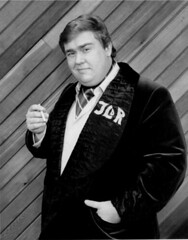
Now there's a role model
I have my theories why Canada puts out such sincere yet ludicrous stuff.
1. They are sincere yet ludicrous.
2. They need to get laid.
3. They hate Americans.
My best theory is that there is a dichotomy between the serious Canadians, those with utmost rectitude, and the ludicrous Canadians who make funny television and movies, and never the twain shall meet. Like I said, I SCTV might have made the video posted above, except it would be Johnny LaRue, Count Floyd, or Edith Prickley flying through the air.
And so you ask: Bookfraud, are you going to stop drinking and blogging?
Tuesday, January 09, 2007
The Bums of Navarone
 If you can’t go home again, you can watch it on cable.
If you can’t go home again, you can watch it on cable.
I had such an experience recently when I saw “The Guns of Navarone” over the weekend. For those unfamiliar, “Guns” is a 1961 movie about an Allied mission to knock out two massive cannons that are blasting the British fleet out of the Aegean. It has an all-star cast: Gregory Peck, David Niven, and Anthony “I Was Zorba the Greek” Quinn.
I remember viewing it several times on the ABC Movie of the Week and the CBS Movie! and such, between the ages of 8 and 12. But I hadn’t seen it for about 30 years.
The verdict on watching “Guns”? It’s bad. Reaaaaaaaaaly bad. It’s not just the cheap-looking special effects, which might have represented the apotheosis of cinematic achievement 46 years ago, replete with bathtub renditions of sinking ships and model-ready fake artillery falling down a Styrofoam mountain into a fake sea. It’s not just the performances, straight outta the 19th Century School of Crappy Stage Acting. It’s not just the stupid love scenes (yes) or the dialog, which features gems like, “If we don’t get the explosives, then the Germans will find them first. That will mean that the mission has failed.”
No, these things I could abide. What put me over the edge was the blood.
As a bullet pierced flesh, it looked like someone had dropped a pot of red ink on the victim's wound. Splotch, splotch.
Of course, the blood is indicative of something larger. When one of the heroes throws a grenade, every German soldier within a five-mile radius collapses. When somebody is shot — even with a single bullet — they fall to the floor dead, silent. No groaning, moaning, no screaming in agony, much less severed limbs and heads being blown apart. You know, the things that happen in combat.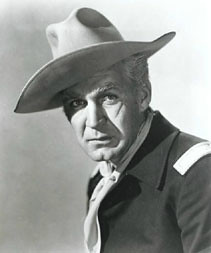
Give this man a cuppa joe
“The Guns of Navarone” also reminded me of “Sands of Iwo Jima,” staring John Wayne. When one man is blodlessly shot in combat, he has the presence of mind to say a shema before dying. (Glad to know that someone in Hollywood thought of the Jews.)
Forrest Tucker, the dude from “F-Troop,” also starred in “Sands,” accounting for the most risible scene ever in the history of war movies. He leaves his foxhole to get ammo for two other soldiers, who are pinned by Japanese snipers. But instead of running back with ammunition, Tucker stops and gets coffee. Yes, he drops by the Iwo Jima Starbucks and gets a grande skim latte while his fellow G.I.s are getting their asses shot off.
“Man, that’s great coffee!” he says, getting a refill (he gets a seconds!). “Here, put some joe in the canteen so I can bring ‘em back to my buddies!” The buddies are dead, of course, because Forrest didn’t get the ammo back to them in time, because he was drinking coffee.
Dereliction of duty never tasted so good.
This is not to dismiss childhood pleasures, or that I should have expected “Guns” to be as gripping as I had envisioned. Things are never as good or bad as one remembers, of course, and I imagine reviewing all of my childhood television and movie consumption would be to simply open a treasure trove of embarrassment.
No, what ate at me the most is that nothing about the movie rang true. Nothing. The Germans are so incompetent, you wonder how they overran Greece in the first place. The blood is so fake that you thought you were watching a commercial for Ragu. The dialog, acting, plot, effects — not a single thing was honest. One can’t expect “Saving Private Ryan” in 1961, much less “Platoon” or “Bride of Chucky,” but I would hope that there’d been something mildly accurate in any movie of any generation.
Mr. Cooler King
Writers must hew to the truth to be worth a damn. I can’t really say that anything in “The Very Hungry Caterpillar” is true, but at least George Bush’s favorite book has some truth in it: the transformation of caterpillar to butterfly. In fact, there’s more truth in “Caterpillar” than George Bush has ever spoken.
If someone turned “The Guns of Navarone” into a novel, it would be…well, “The Guns of Navarone,” a 1957 novel by Alistair MacLean. Fiction writers don’t want to write what happened, but they want the truth. That’s the only thing that matters, be it a truth about human character, the narrator’s pet Shar-pei, or the price of gasoline.
I had something profound to say to end this, but I forgot what it was. Oh, yeah. If you really want to see a great war movie, try "The Great Escape." Charles Bronson. James Gartner. James Coburn. Dudes digging tunnels. Evil Nazis. Best off all, Steve McQueen, the Cooler King, trying to jump a barbed-wire fence on a motorcyle. What more could you want? And here's the kicker: "The Great Escape" actually happened.
Labels: movies, versimillitude, writing
Sunday, January 07, 2007
It Makes Me Sick
 I thought about calling this post “Illness as Metaphor.” However, that would represent a kind of intellectual plagiarism, as well as skirting the matter, and I have read about as much Susan Sontag as I have Vladimir Polensk Isneninov (out of print).
I thought about calling this post “Illness as Metaphor.” However, that would represent a kind of intellectual plagiarism, as well as skirting the matter, and I have read about as much Susan Sontag as I have Vladimir Polensk Isneninov (out of print).
There’s no gentle or cerebral way to put it: I suffer from frequent illnesses of the bacterial variety, and I will probably not be relieved of this condition for the rest of my years.
These colds— attacks of sinusitis, to be precise — have plagued me for most of my adulthood. Though one can take preventive steps to avoid contracting them, once I get sick, it’s Mucous City, Exhaustionville, City of Slug.
When I get sick, it’s also a great excuse not to write, not to blog, not to visit other’s blogs. And I they can help me ignore world poverty, the war in Iraq, global warming or any other inconvenient truths that my mess up my fragile psyche.
As Wife heads down the road to delivery and I down the road to impending happiness and responsibility, I realize how much this tendency to become ill makes me rather melancholy. I’ve been able to attend work, and been managing to post to the blog, but the rest of blogworld has been a void — no visits, no comments, nothing.
I catch sinus infections at predictable times: changes in the weather, lack of sleep, time spent in arid places (after four days in Las Vegas without a humidifier, I came back ill. So much for what happens there staying there. Does that slogan also mean VD?).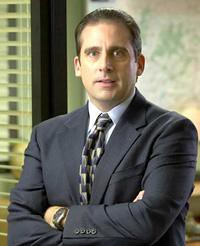
Sinusitis will turn you into this man
The latest such incident comes after a trip to visit my wife’s family over the holidays. I awaited at a gate full of screaming children and rode in an airplane with recirculated air. I slept in dry apartment and would wake up feeling as if someone had an extremely large finger up my nose. I ate a lot of food saturated in fat and drank at least one too many beers each night.
By the time we returned, I couldn’t breathe out of my nose. Each night I slept with open mouth, and I often I awoke with the sensation that somebody had been dumping sand down my throat.
For those uninitiated with sinus infections, they are a beast of a particular nature. Not really a “cold,” but not the flu, either, they are marked by heavy congestion, exhaustion, and massive amounts of mucous (of such a particular green-brown-yellow tint that trying to describe it would do it no justice).
The thing that sucks about getting a sinus infection is that it lays you low for a couple of weeks, but not badly enough to miss work. It makes you unproductive, listless, and stupid, which makes for a great imitation of the incompetent managerial class. One is essentially transformed into a life-support system for a snot factory.
About a dozen years ago, things had gotten so bad that I was getting sick every month. I had been to doctors – many doctors, each who had his own, incorrect theory about the source of my misery. I had allergies. Asthma. Chronic fatigue syndrome. I probably would have been diagnosed with mad cow had it been in vogue.
Finally, it occurred to me that perhaps an otolaryngologist (you know, an ear, nose, throat dude) just might be the right person to see. It was found that I had polyps blocking my nasal passages that would require surgery. The surgery was a success, and the frequency and severity of my colds decreased. But the sinus infections never went away completely.
The problem with sinusitis is that it lays both your body and mind inoperable. You can spend hours staring at a computer screen, having forgotten why you even turned on the computer in the first place. 
Germ warfare
I imagine that these bouts of infections will become more frequent after our son is born, being that parental sleep becomes as precious as that stupid ring Gollem kept wheezing over. I’m already worried that I will never have time to write once the child has taken over our lives, and that I am likely to be ill much of the time makes me more neurotic still.
Then again, they say early parenthood is like feeling you’re sick all the time. Perhaps this has been this cosmic training, my body’s way of preparing me for fatherhood, all the suffering for all those years having a real purpose in life.
OK, now that has been settled, I have to blow my nose for two minutes straight.
Labels: illness, parenthood, writing
Wednesday, January 03, 2007
Resolute
 I am loathe to make New Year’s resolutions, as I see no reason for waiting until January 1 before changing bad behavior.
I am loathe to make New Year’s resolutions, as I see no reason for waiting until January 1 before changing bad behavior.
In addition, I am more likely to attend a Star Trek convention dressed as a Klingon chick than to keep any resolutions I make.
Still, exhausted from my holiday sojourn to places far from home, I am unlikely to write an entry actually worth reading for several days, not that anything published here is worth reading, anyway.
But enough of the spirited self-depreciation. Bookfraud Mark II. Or, 2007.
•I will endeavor to give up smoking, drinking, whoring, and shooting up, and will not write “objective correlative” ever again.
•Every day, I will write something about my addiction to _________ as I hope to write a non-fiction masterpiece.
•Every day, I will write something about how I don’t want to write a non-fiction masterpiece.
•I will continue to try and get my novel published, with the hope that my son can hold his head high and say, “My dad isn’t a total failure!”
•In the spirit of impending fatherhood, so that my son will grow up in a kind, non-threatening, loving environment, I hereby promise to strike the following words and phrases from my vocabulary: Fuck. Goddamn. Damn. Shit. Motherfucker. Asshole. Dickhead. This should leave me with about eight words.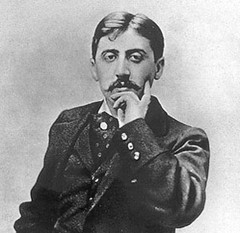
My main man Marcel
•Also, I will not pound my fist on my desk and scream “Goddamn motherfucking piece of shit!” every time my computer crashes. Every second time should be sufficient to teach the computer a lesson.
•Instead of spending hours in front of the television, my brain eaten away as surely as an eagle feasted on Prometheus’ booze filter, I will read, think, and drop allusions to Greek mythology in my prose.
•If, years from now, my son says, “I like musicals,” I will not freak out nor will I fall into a bigoted depression. Instead, I will tell him, “Did you know ‘Full Metal Jacket’ has some great music in it?”
•I may also tell my Broadway-addled son, “Play baseball or else.”
•I will empty the hateful caldron of my brain of bad thoughts towards other people, strangers in particular, who have the innate, magical ability to ruin my commute every morning through their fine language of body and mouth. For those of you who push and scream and make 90 minutes of my work day a living hell, I won’t belittle your intelligence, mock your appearance, or fantasize that when you are walking up your driveway, a B-52 will drop six tons of excrement on you.
•I resolve to faithfully visit other blogs, comment regularly, and provide the support that bloggers deserve in the icy catacombs of cyberspace.
•I also resolve to quit my job so that I can have time to visit other blogs, not to mention write about my addiction to _________, visit museums, go to plays, travel, build my own villa on Lake Como, and learn how to play the violin better than that damn Joshua Bell.
•Instead of bitching about global warming and how our President and his cronies are trying to deny it, I will do something, starting with buying pollution credits — the more you credits buy, the less carbon dioxide a utility will dump into the air.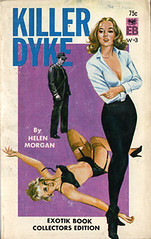
Killer lit!
•I will read the 20th Century Classics “The Man Without Qualities,” “Ulysses,” and “A la recherche du temps perdu.”
•I will then read the 20th Century Classics “All-Girl Office,” “Killer Dyke,” and “Orgy of the Dolls.” Several times.
•And to ensure that 2007 will be a happy year for Wife as she approaches motherhood, I will take it upon myself to voluntarily cook, clean, and keep house.
•Stop laughing.
Monday, January 01, 2007
Best American Whatever
 I am sitting in an airport terminal, stoked on Diet Coke With Lime, feverishly trying to get my thoughts online before the stroke of midnight.
I am sitting in an airport terminal, stoked on Diet Coke With Lime, feverishly trying to get my thoughts online before the stroke of midnight.
Because if this is dated Dec. 31, I figure that I will qualify for the “Best American Essays 2006,” forcing a massive recall of the already-published volume; the publishers will then reissue the collection to include the very essay that now sits before your hung over, bloodshot eyes.
It’s not that this “essay” is better than everything in “Best American Essays,” but I know that it’s better than something in the book, certainly better than a few I’ve already read. It’s not that the writing is pedestrian or bad, as everything in this collection is competent and sensible.
But that’s just it. Many of what’s in there is merely competent: either the ideas or writing is interesting, but never both. It only gets halfway there. It’s like a doctor who makes a proper diagnosis and then prescribes “Doc Bonar’s Miracle Elixir” as the cure.
I don’t want competent. I don’t want merely engaging. I want transporting. I want power. I want Charlize Theron, Angelina Jolie, or Uma Thurman. (Any one will do! Though Uma would be tops.)
I’ve always found that these books are more of a point of comparison rather than inspiration, as in, “I can’t believe that this whale turd of a story even got published in the first place.” This sentiment always followed completion of a particularly lame entry in “Best American Short Stories of 20__” (Or of “19__”).
The reason I’m even reading “BAE 2006” is that I’m trying to work on another “project” as I watch my most recent book sink like Captain Ahab attached to the Great White Whale (Turd), that Whale (Turd) being my unpublished novel. This yet-as-fleshed-out work of non-fiction is about my addiction to ________, and figured “Best American Essays” would help kick start the project.
It hasn’t worked. I’ve read barely half of this collection, but it feels like I’m reading the same old shit again and again. Some of the pieces follow a well-worn template, the Voyage of Discovery under the guise of a Larger Issue: Racism, Human Sexuality, Addiction & Recovery, The Length of My Armpit Hair. Those types of essays are the Doc Bonars of the group, the ones I’ve read so far and prompted me to put pen to paper as I await Accidentally On-Time Airlines to get a damn plane to the damn gate.
Didion: the real deal
The fully accredited surgeons in this group are the usual suspects: Adam Gopnik, Susan Orlean, Oliver Sacks, otherwise known as 2006’s Traveling All-Stars of The New Yorker. I haven’t read the latter three’s entries as of yet, but I know that they will be interesting and well-written, and have nothing to do with Armpit Hair. (Even before I peruse them I know Gopnik’s will be a first-person account of a personal matter like fatherhood or life in Paris; Orlean’s will be about a person far more unusual than we meet in daily life; and Dr. Sacks will regale us with a medical condition dealing with the brain, like the Dude who Mistook His Weiner for a Cadillac Escalade SUV).
This is all good but hardly a inspiration to write about my addiction to _________. Perhaps I was expecting something along the lines of Mark Twain, Joan Didion, H.L. Mencken. I pulled out an old volume of essays and read a couple by Didion — short, brilliant, and packing more power in a single paragraph that some essayists can generate in a lifetime.
It makes me wonder about the “Best American” series. To say that it has spawned a life of its own would be a folly of understatement. There’s a “B.A.” collection for everything: short stories, essays, travel writing, science writing, music writing, erotica, sports writing, and several more; I suspect that soon we will be subjected to “Best American Letters to the Editor, ” “Best American Classified Ads, ” and “Best American Footnotes. ” The “Best” has become a publishing genre into itself. They'll have the “Best of the Best American Writing Series” within a few years.
That’s what I should be aiming for. Not to write a piece that will provoke and promote debate, as an essay, or writing that entertains and challenges and gives insight into the human condition, as a short story. Or something simply to inform, such as a book review or a travel piece. I should be writing a Best American Crap of Some Sort That Involves Words.
Completely gratuitous photo of yet another woman I will never meet
Well, I didn’t quite finish this before 2006 ended, as I actually got on a flight, landed, took a cab home, spent New Year’s Eve with a cold that staged its own Phlegmapalooza, annoyed Wife with my incessant whining, went to sleep at 10 p.m., and awoke to a new, damp year. Maybe this will make it into “Best American Essays” of 2007. All I need is a magazine to pick up this essay.
You know you want to. It will make 2007 the Best year ever.
Labels: collections, essays, writing
